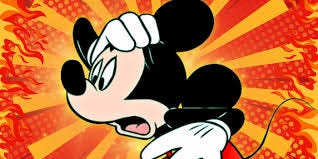Reich: Why Disney Blinked and Put Kimmel Back on the Air
Ignore the Mouse's gauzy claims about "thoughtful conversations" with the host -- it was economic and political pushback from those who oppose Trump's right-wing extremism that prevailed.
By Robert Reich
Friends,
ABC says “Jimmy Kimmel Live!” will return to the airwaves next Tuesday — less than a week after Trump henchman Branden Carr, chair of the Federal Communications Commission, said on a podcast that Kimmel’s remarks were part of a “concerted effort to lie to the American people,” and that the FCC would have “do this the easy way or the hard way” — suggesting that either ABC and its parent company, Walt Disney, remove Kimmel or the FCC would revoke ABC’s broadcast license.
Why Walt Disney Company’s turnaround? It limply explained today:
“Last Wednesday, we made the decision to suspend production on the show to avoid further inflaming a tense situation at an emotional moment for our country. It is a decision we made because we felt some of the comments were ill-timed and thus insensitive.”
But now, apparently, all is well.
“We have spent the last days having thoughtful conversations with Jimmy, and after those conversations, we reached the decision to return the show on Tuesday.”
How lovely. How reasonable. How, well, kumbaya. All it took were some “thoughtful conversations with Jimmy” and everything returned to normalcy.
Don’t believe it. In the days since ABC’s decision, the blowback against Disney has been hurricane level.
Organized opposition matters. At least five Hollywood unions, collectively representing more than 400,000 workers, have publicly condemned the company.
The screenwriters’ union decried what they called “corporate cowardice,” and organized a protest last week outside the main gate at Disney headquarters in Burbank, Calif.
Celebrities Tom Hanks amd Meryl Streep called out “government threats to our freedom of speech.”
Kimmel was supported by his late-night peers including Stephen Colbert, Jimmy Fallon, Seth Meyers, and John Oliver, as well as former late-night hosts David Letterman, Conan O’Brien, and Jay Leno — all of whom blasted the decision.
Damon Lindelof, a creator of ABC’s “Lost,” said that if Kimmel’s program did not return from suspension, he couldn’t “in good conscience work for the company that imposed it.”
Michael Eisner, a former Disney CEO, issued a rare rebuke.
Even rightwing Republican Senator Ted Cruz expressed concern, likening Carr’s comments to a mob boss and calling his threats to potentially retaliate against media companies “dangerous as hell.”
“We should not be in this business,” Cruz said. “We should denounce it.”
The public speaks. By Monday morning, Carr himself was busy minimizing his role — denying that he had threatened to pull the licenses of ABC stations (it “did not happen in any way, shape or form”) — and claiming Disney had made a “business decision” in response to feedback from viewers and affiliates.
“Jimmy Kimmel is in the situation that he’s in because of his ratings, not because of anything that’s happened at the federal government level,” Carr said.
But the most intense pressure came from us — from Disney viewers and customers —who immediately began to cancel subscriptions to Disney+ and Hulu and threaten a broader consumer boycott.
Some stars such as Tatiana Maslany (star of Marvel’s Disney+ series She-Hulk: Attorney at Law) and Rosie O’Donnell urged people to cancel their subscriptions.
But the consumer boycott seems to have begun almost immediately.
Shortly after Kimmel’s suspension was announced, Disney stock dipped about 3.5 percent and continued to trade lower in subsequent days. That loss in market value has amounted to about $4 billion.
Investors knew consumers were upset. There’s never one single reason for the ups and downs in the value of a particular firm’s shares of stock, but the correlation here has been almost exact.
The bottom line: We have extraordinary power. We’re the vast majority. Like every other big corporation, Disney relies on us.
Even if we can’t count on our elected politicians to protect our First Amendment rights, we can rely on ourselves. When our outrage translates into withholding our consumer dollars, a big corporation like Disney is forced to listen — and respond.
Remember this.
Former Labor Secretary Robert Reich’s book is the memoir, “Coming Up Short.” Subscribe to his newsletter here.

